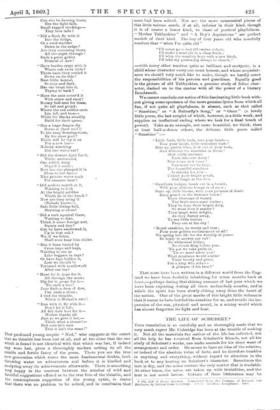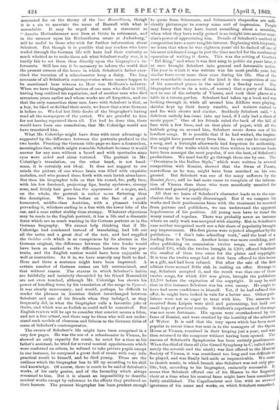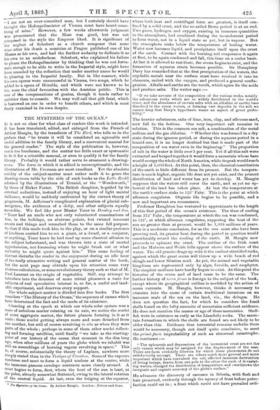THE LIFE OF SCHUBERT.*
Tuts translation is so carefully and so thoroughly made that we very much regret Mr. Coleridge has been at the trouble of making it. Not all the materials the author of the life has collected, not all the help he has received from Schubert's friends, not all his study of Schubert's works, can make amends for his sheer want of arrangement and order. Ile seems to have no idea of the relative, or indeed of the absolute value of facts, and he therefore tumbles in anything and everything, without regard to situation in the book or to any bearin,, on Schubert's character. Sometimes the text is dry, and the notes contain the only matter that is readable. At other times, the notes are taken up with trivialities, and the text is not much better. Certain of these littlenesses may be
accounted for on the theory of the lees Boszeelliana, though it is a sin to associate the name of Boswell with what is unreadable. It may be urged that such a statement as " Anselm Hiittenbrenner now lives at Griitz in retirement, and in the summer upon his Rothenthurm estate at Judenburg," will be useful to those who wish for further information about Schubert. But though it is possible that any readers who have waded through the German life will have had their curiosity so much whetted as to make them ask what Schubert really was, it is hardly fair to set them thus directly upon the biographer's informants: Still less can it be necessary to inform the world that the present owners of the house in which Schubert's father exercised the vocation of a schoolmaster keep a dairy. The long accounts of all Schubert's contemporaries whose names happen to be mentioned bear witness to Herr von Hellborn's industry. When we have biographical notices of one man who died in 1831, having long outlived his reputation, and of another man who died seventeen years earlier and whose works are all forgotten, and see that the only connection these men have with Schubert is that, as a boy, he liked or disliked their music, we know that a true German is before us. We feel but little doubt of the biographer's having read all the newspapers of the period. 1Ve are grateful to him for not having reprinted them all. Yet had he done this, there would have been one consolation, that Mr. Coleridge would not have translated him.
What Mr. Coleridge might have done with most advantage is suggested by the difference between the portraits prefixed to the two books. Fronting the German title-page we have a featureless, meaningless face, which might resemble Schubert because it would answer for any man without a beard and with spectacles since eyes were aided and chins tortured. The portrait in Mr. Coleridge's translation, on the other hand, is not handsome, it is certainly not ideal. It does not suggest to our minds the picture of one whose brain was filled with exquisite melodies, and who poured them forth with such lavish abundance. But then his biographer tells us that his round, fat, puffy face, with his low forehead, projecting lips, bushy eyebrows, stumpy nose, and frizzly hair gave him the appearance of a negro, and, on the whole, the portrait is rather more flattering than the description. We have before us the face of a goodhumoured, middle-class Austrian, with a pleasant twinkle pervading it, whiskers ending in a line with the lower lobe of the ear, and a nose rather stubby than stumpy. Whatever objections may be made to the English portrait, it has a life and a dramatic force which are as much wanting in the German portrait as in the German biography. We cannot help thinking that if Mr. Coleridge had condensed instead of translating, had left out all the notes and a great deal of the text, and had supplied the lueidus ordo which is so conspicuous by its absence in the German original, the difference between the two books would have been as marked as the difference between the two portraits, and the English version would have been enjoyable as well as instructive. As it is, we have scarcely any fault to find. Here and there a sentence might have been improved. A certain number of German names are left untrauslated, and that without reason. The stanzas in which Schubert's habits are faithfully and incisively chronicled by his friend Bauernfeld are not even touched, although Mr. Coleridge has shown his power of handling verse by his translation of the songs in Egmont. It was clearly unnecessary, and would, perhaps, be difficult to render the phrases in Austrian dialect interchanged between Schubert and one of his friends when they indulged, as they frequently did, in what the biographer calls a favourite joke of theirs, and which was as foolish as could well be conceived. But English readers will be apt to consider that convict means a felon, and not a free school, and there may be those who will not understand such models of clearness and fulness as the German titles of some of Schubert's contemporaries.
The events of Schubert's life might have been comprised in a very few pages. He was the son of a schoolmaster in Vienna, he showed an early capacity for music, he acted for a time as his father's assistant, he tried for several musical appointments which were conferred on others, he refused to take private pupils except in one instance, he composed a great deal of music with very ittle practical result to himself, and he died young. These are the outlines which the biographer has to fill up according to his skill and knowledge. Of course, there is much to be said of Schubert's works, of his early genius, and of the fecundity which always remained to him. But it is almost an impossibility to describe musical works except by reference to the effects they produced on their hearers. The present biographer has been prudent enough
to quote from Schumann, and Schumann's rhapsodies are sat& ciently picturesque to convey some sort of impression. People may fancy that they have learnt something about a musician, when what they have really gained is an insight into another mini. cian's power of appreciating him. Details of Schubert's method of composition have a more tangible interest. Beginning with his youth, we learn that when he was eighteen years' old he dashed off one of his most celebrated songs in just the time needed for the mechanical operation of writing it down. This was the setting of Goethe's " Erl King," and when it was first sung in public six years later, it at once brought Schubert into general and favourable notice. The year in which it was written was his most prolific year, but similar feats recur more than once during his life. One of the most remarkable instances of the kind is the composition of one of his concerted pieces in the midst of a Sunday revel. The biographer tells us (in a note, of course) that a party of friends met in one of the suburbs of Vienna, and took their places at a table in a tavern garden. Schubert had taken up a book and was looking through it, while all around him fiddlers were playing, skitth.s kept up their heavy rumble, and waiters rushed to and fro with shouts and clatter. Suddenly Schubert said, "A delicious melody has come into my head, if I only had a sheet of music paper." One of his friends ruled the back of the bill of fare with a few lines, and on that piece of paper, with all the hubbub going on around him, Schubert wrote down one of his loveliest songs. It is possible that if he had waited, the inspiration might have passed away from him. In one case he composed a song, and a fortnight afterwards had forgotten its authorship. Yet many of the works which were thus written in extreme haste have been amongst the most popular, if not the best, of Schubert's productions. We need hardly go through them one by one. The "Overtures in the Italian Style," which were writteu in avowed competition with Rossini, showed that the Swan of Pesaro, marvellous as he was, might have been matched on his own ground. But Schubert was one of the many sufferers by the Rossini/seer, arid he had more cause to complain of the infatuation of Vienna than those who were manifestly unsuited for sudden and general popularity.
All that we learn of Schubert's character leads us to the conclusion that he was easily discouraged. But if we compare his works and their posthumous fame with the treatment he received from patrons and publishers, we can understand the apparent hopelessness of his position. All young men have to tread the weary round of repulses. There was probably never an instance where an early work was accepted with alacrity. But in Schubert's case neither recognized merit nor a fair share of popularity brought any improvement. His first pieces were rejected altogether by the publishers. "I don't take schoolboy work," said the head of a leading firm in Vienna. Another house was more confiding, and after publishing on commission twelve songs, one of which realized /80, while the twelve brought in /200, offered Schubert the smaller of these two sums for the plates and copyright. It is true the twelve songs had at first been offered to this house as a gift, and bad been refused. But after the sale of the first edition there seemed little risk in making an offer. Strange to say, Schubert accepted it, and the result was that one of these twelve songs, for which 180 was given, brought the publishers 12,700 before the expiration of the copyright. It may be said that in this instance Schubert was his own enemy. He ought to have had more confidence in himself. Yet, if he bad refused this offer, he might have looked in vain for a better one. Other publishers were not so eager to treat with him. The answers he received from Leipsic were civil and patronizing, but held out small hope of practical results. Schubert's experience of the stage was not more fortunate. His operas were overshadowed by the fame of Rossini, and were crushed by the hostility of the admirers of Weber. It is said that the very opera which has been most popular in recent times was sent in to the managers of the Opera House at Vienna, remained in their keeping just a year, and was then returned to the composer without having been opened. The success of Schubert's Symphonies has been entirely posthumous. When the chief of them all (the Grand Symphony in C, called alternately the seventh and the ninth) was first offered to the Musical Society of Vienna, it was considered too long and too difficult to be played, and was finally laid aside as impracticable. We come to church music, in which branch also Schubert was not only pre' lific, but, according to his biographer, eminently successful. seems that Schubert offered one of his Masses to the Imperial choir at a time when his musical fame might have been considered fairly established. The Capellmeister met him with an avowed ignorance of his name and works, on which Schubert remarked, .1 am not an over-conceited man, but I certainly should have thought the Hofeapellmeister of Vienna must have heard something of mine." However, a few weeks afterwards judgment was pronounced that the Mass was good, but was not composed in the style the Emperor liked. It is significant of the neglect of Schubert as a church composer that some time after his death a musician at Prague published one of his lasses as his own, and had the further audacity to dedicate it as his own to an archduchess. Schubert, who explained his failure to please the Hofcapellmeister by thinking that he was not fortunate enough to be able to write in the Imperial style, might have been consoled by the reflection that under another name he would be pleasing to the Imperial family. But in like manner, while his own operas were unsuccessful in Vienna, two songs, which he added to a opera of Herolds, and which were not known to be his, were the chief favourites with the Austrian public. This is one of the compensations of genius, though it tends rather to embitter than to console. We may well call that gift fatal, which is bestowed on one in order to benefit others, and which is most freely exercised in its own despite.




































 Previous page
Previous page